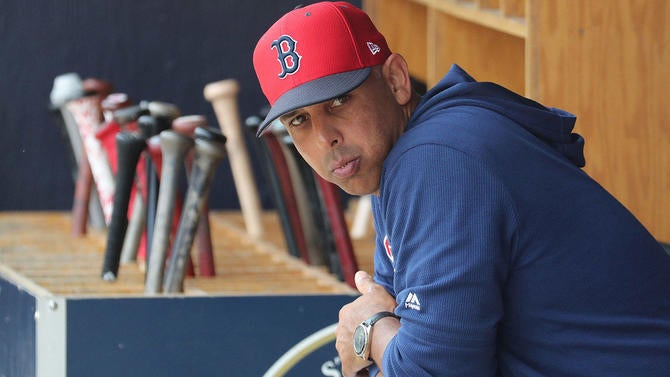On Wednesday, Major League Baseball officially branded the 2018 World Series champions as cheaters. Commissioner Rob Manfred released the report on MLB's investigation into the 2018 Boston Red Sox, a team that was anonymously accused of using its video replay room to steal signs, and disciplined the club for doing pretty much exactly what it was said to have done. They stole signs illegally.
"I find that J.T. Watkins, the Red Sox video replay system operator, on at least some occasions during the 2018 regular season, utilized the game feeds in the replay room, in violation of MLB regulations, to revise sign sequence information that he had permissibly provided to players prior to the game," Manfred said in his report.
Watkins has been suspended without pay for the 2020 season -- a season that might not be played -- and he can not work in the same capacity in 2021. I reckon the organization will keep him around in a different capacity and he'll be fine. His father is the scout who signed Mookie Betts. The Red Sox were also stripped of their 2020 second-round pick (No. 52 overall) and former manager Alex Cora was suspended for the 2020 season. Cora was identified as a ringleader in the 2017 Astros sign-stealing scandal.
"Alex Cora will be suspended through the conclusion of the 2020 Postseason for his conduct as the bench coach of the Houston Astros in 2017," Manfred wrote. "While I will not impose additional discipline on Cora as a result of the conduct engaged in by Watkins (because I do not find that he was aware of it), I do note that Cora did not effectively communicate to Red Sox players the sign-stealing rules that were in place for the 2018 season."
That's quite a turnaround, huh? With the Astros, Cora was one of the masterminds behind an elaborate sign-stealing scheme that may or may not have helped the club win the World Series, then the very next year he had no knowledge of a similar* sign-stealing scheme with his new team in his new role as manager. Just a coincidence, I guess. Cora was an innocent bystander. Wrong place, wrong time.
* According to Manfred's report, Houston's scheme started with Astros players decoding signs in the video room, then using them so the runner at second base could relay the sign to the hitter. They later graduated to banging garbage cans and whatnot. The Red Sox did the same thing. They used the video room to decode signs so the runner at second base could give them to the hitter.
Keep in mind though, when Manfred disciplined the Astros, he noted then-manager A.J. Hinch "neither devised the banging scheme nor participated in it," but he was suspended because he "did not stop it and he did not notify players or Cora that he disapproved of it." Hinch did not participate in the sign-stealing scheme with Houston and was suspended one year. Cora was an active participant in the Astros' scheme but did not participate in Boston's scheme and was suspended ... one year? Inconsistent, that is.

When Manfred disciplined the Astros, the punishment simultaneously felt severe, yet too light. The punishment was unprecedented in baseball history, truly, but considering the extent and scope of the sign-stealing scheme, it felt like a slap on the wrist. The Astros kept their title, the players were not punished in any way, and owner Jim Crane was emboldened to say he takes no responsibility.
Boston's punishment does not have the same feel. It is astonishingly light, not only compared to the Astros' punishment -- the Red Sox did not even receive the token $5 million maximum fine -- but also because the Red Sox were repeat offenders. The club was fined for the Apple Watch scandal in Sept. 2017. Here's what Manfred wrote in his statement when the fine was announced (emphasis mine):
"In assessing the significance of this violation, the investigation established three relevant points. First, the violation in question occurred without the knowledge of ownership or front office personnel. Second, when the Red Sox learned of the Yankees' complaint, they immediately halted the conduct in question and then cooperated completely in my investigation. I have received absolute assurances from the Red Sox that there will be no future violations of this type. Third, our investigation revealed that Clubs have employed various strategies to decode signs that do not violate our rules. The Red Sox' strategy violated our rules because of the use of an electronic device."
The Red Sox got caught illegally stealing signs in 2017, assured the commissioner they wouldn't do it again, and then they brazenly did it again the very next season. Despite that, their punishment was more lenient than Houston's. Manfred justified this in his report by laying the blame on Watkins, and absolving everyone above him. The low-level staffer is wearing it.
"In addition to my September 15, 2017 warning to all Clubs that future violations of MLB's sign-stealing rules would 'be subject to more serious sanctions,' I specifically advised the Red Sox that I 'expect your strict adherence to the On-Field Regulations
going forward,'" Manfred wrote in his report. "Numerous witnesses described that both then-President of Baseball Operations Dave Dombrowski and current General Manager Brian O'Halloran subsequently communicated the importance of adherence to rules to employees, including Watkins."
In a 2017 memo, Manfred alerted teams that the manager and general manager would be held accountable for sign-stealing, yet neither Dombrowski nor O'Halloran were disciplined. They held the same positions in 2017 as 2018, so it's not like they were new to the job and unaware of the memo. The Red Sox cheated, Manfred said leadership would be held accountable, the Red Sox cheated again, but leadership was not held accountable. Dombrowski and O'Halloran passed the buck to the people below them and that's apparently enough to avoid discipline as a repeat offender.
Not only that, but Manfred downplays the Red Sox's sign-stealing by noting it only happened in a small percentage of plate appearances. "The information was only relevant when the Red Sox had a runner on second base (which was 19.7% of plate appearances league-wide in 2018), and Watkins communicated sign sequences in a manner that indicated that he had decoded them from the in-game feed in only a small percentage of those occurrences," he wrote. It didn't happen often, but when it did, it happened during the game's most important moments. That's not OK!
I'll give Manfred this: he announced the Red Sox's discipline at exactly the right time. It'll be quickly pushed out of the news cycle by Thursday's NFL Draft and the MLB season is still weeks away, maybe months. By time baseball returns, everyone will be so happy the game is back that no one will care about the Red Sox (or the Astros, for that matter) being punished weeks ago. If MLB wanted to bury the news -- and the league did, undoubtedly -- there was no better time to do it than right now.
Make no mistake though, baseball has a major credibility problem right now. Two of the last three World Series winners have been outed as serial cheaters and the public perception is that the punishment does not fit the crime. Players around the league were upset the Astros were not stripped of their title and they weren't shy about it. Now the Red Sox, a team that had been warned not to steal signs once before, stole signs again during a highly successful season, and their punishment was not nearly as harsh as Houston's.
The punishment is not nearly enough of a deterrent. Steal signs and you might win a World Series, and the worst-case scenario is what, you get caught, lose a draft pick(s), and have to find a new manager? That's not stopping anyone.


















